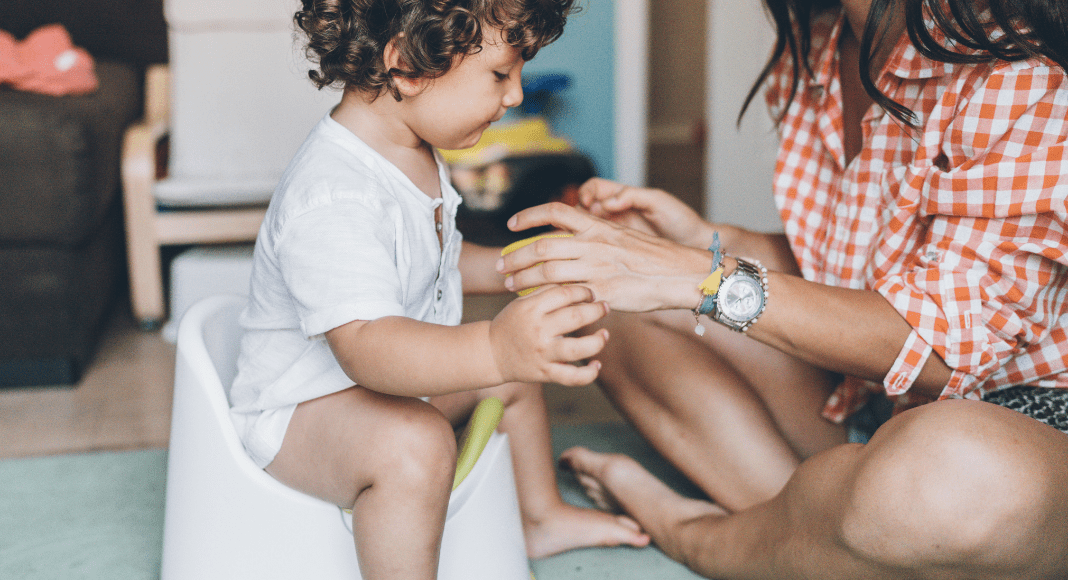 Has anyone ever told you their little one was potty trained by 15 months old? Maybe you’ve heard someone talk about how easy it was to potty train their daughter, and you’re wondering, “Why is it taking us so long? I’m sick of changing diapers!” Dr. Hill from our partner Prevea Health is providing us with tips on potty training.
Has anyone ever told you their little one was potty trained by 15 months old? Maybe you’ve heard someone talk about how easy it was to potty train their daughter, and you’re wondering, “Why is it taking us so long? I’m sick of changing diapers!” Dr. Hill from our partner Prevea Health is providing us with tips on potty training.
Please know, it’s okay. You’ll get there! Toilet training does not have to be a mystery, and it doesn’t have to be a battle, either. With some basic tips, and most importantly, patience, you can successfully transition your child from diapers to using the toilet.
- Patience is important because children don’t potty train on our schedules as parents or caregivers. Attempting to have children potty train on our schedules as adults will most likely cause frustration, for us and our child. Also, kids are smart. It doesn’t take children long to realize they don’t have to do a task that mom or dad wants them to do — no matter what mom or dad says or does.
- Timing is key. Although there are exceptions, most kids aren’t ready to start potty training until at least age 2. In fact, peak toilet training interest is between 27 and 34 months old. A good rule of thumb: Wait to start potty training until your child can voluntarily hold their urine and stool. This is usually between 18 months and 2 years old, but it may not happen until 34 months.
- Watch for signs that your child is ready. If your child is starting to grab the front of their diapers, wiggling around uncomfortably, or even doing a little dance, they may be starting to hold their urine. These are good signs indicating that your child may be ready, and this is an opportunity to attempt to start toilet training.
- If you get resistance, take a break. It’s not worth the struggle. Potty training resistance, which can be very common around age 3, means it’s time to take a break from potty training. Try starting again in a few weeks or even up to two months later, after your child shows interest again. It’s better to back off and take a break than to get frustrated and get nowhere with using the potty. Taking a break won’t hurt your child’s progress. You can revisit again soon!
- In sight, in mind. When your child is about 18 months old, consider getting a potty chair and leaving it out.
- Encourage curiosity. Once your potty chair is out, allow your child to come into the bathroom when you are using it so they can see what you are doing. Older siblings can also help by doing the same thing. Encourage your child by saying, “Someday you’ll be able to use the potty like mom or dad.” The key here is to encourage, not to force it. It’s okay to ask them if they want to sit on the potty. It’s not helpful to force them.
- Establish a routine. You can make trips to the potty part of a daily routine, such as after meals, before naps, and before bed. Consider these practice runs.
- Praise and celebrate. If your child is successful, treat the situation as if it is the greatest thing ever! If practice runs don’t work out, praise them for attempting as well.
- Use your words. Ask your child to tell you when they’re wet or dirty, or when they need to pee or poop. Initially, they will tell you after the fact, but this is definitely a step in the right direction. That means they are starting to become aware of their bodily functions.
Soon your child will recognize the signals of the need to use the potty. They may not always be successful, and they may go right after they get off the potty. That’s okay. Don’t get discouraged.
- Pull on those Pull-Ups®! Once your child has had repeated success using the potty, suggest pull on or easy up diapers, or cotton training pants. This is a big step and should be recognized and praised as a big deal. It may be a good idea to continue routine planned trips to the potty for a while. Expect accidents, because they will occur.
- Wet at night is okay. Diapers at night are definitely okay for a while. Children may not be dry at night until somewhere between 5 and 6 years old.
The biggest takeaway here is: Don’t worry and don’t be in a hurry. Oftentimes, when children are ready, they will let you know. It’s also helpful to remember that every child is different and a potty training technique that works for one child may not work for another, so it’s okay to try different approaches if things aren’t going the way you expect. There are also additional steps that can be taken to help a reluctant toilet trainer. If your 3.5 to 4-year-old shows no interest in toilet training, talk to your child’s doctor and ask them for help.

Michelle Hill, MD, is a pediatrician at the Prevea West De Pere Health Center. She attended medical school at the Medical College of Wisconsin and completed her residency at Saint Louis University. She enjoys working closely with families to ensure their children receive the best possible health care. Dr. Hill and her husband are from the Green Bay area and have two daughters. Click here to learn more about Dr. Hill and to schedule an appointment online, or call (920) 496-4771.

















